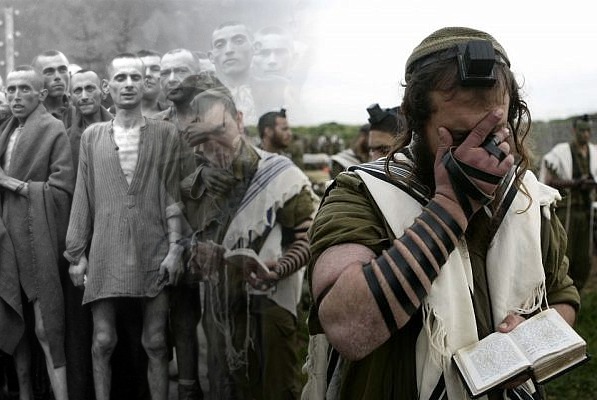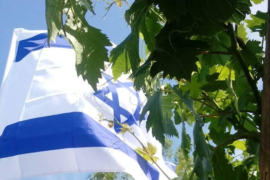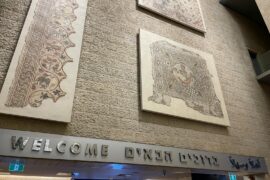In Parshat Emor, we find the prohibition against desecrating the Creator’s Name (Divine Ideal as it’s perceived in this world).
“You shall not desecrate My holy Name, rather I shall be sanctified within the children of Israel; I am HaShem Who sanctifies you, Who took you out of the land of Egypt to be a G-D unto you; I am HaShem.” (Vayikra 22:32-33)
The Rambam explains this commandment by teaching that “the entire house of Israel is commanded regarding the great mitzvah of Kidush HaShem, as (Vayikra 22:32) states: ‘I shall be sanctified within the children of Israel.’ Also, they are warned against desecrating [His holy Name], as [the above verse] states: ‘You shall not desecrate My holy Name’.” (Hilkhot Yesodei HaTorah 5:1)
These mitzvot are given to not only each and every individual Jew to be safeguarded in our private lives but also to the Hebrew nation to be performed as a collective. It is our responsibility to actively sanctify – and guard against desecrating – G-D’s Name through our behavior.
In both the company of fellow Jews and in the presence of gentiles, we must be incessantly careful to conduct ourselves with honor, integrity and consideration towards others. We must be conscious of the fact that the Jewish people is the national expression of HaShem in this world and that our conduct is a direct reflection of His Divine Ideal. This awareness should fill us with a sense of tremendous responsibility, making us vigilant to avoid behavior that could potentially cause others to look negatively upon Israel.
While the Torah world today sufficiently emphasizes this mitzvah on an individual level, the importance of this concept on a national level is regrettably often ignored. In order to fully understand the notion of Kidush HaShem on a collective scale, we must look to the Books of our Prophets – prophecies meant to teach us how to function as a healthy people on our native soil capable of manifesting the Divine Ideal in our national life.
“So I poured My anger upon them because of the blood that they poured upon the earth – and they defiled it with their idols – so I scattered them among the nations and they were dispersed among the lands. According to their ways and their doings did I judge them; and they came to the nations to which they came, and they desecrated My holy Name when it was said of them, ‘These are HaShem’s people, but they departed His land’; but I pitied My holy Name that the house of Israel desecrated among the nations to which they came.” (Yeḥezkel 36:18-21)
HaShem rebukes Am Yisrael for desecrating His Name among the nations. It is important to note that the Creator does not accuse Israel of desecrating His Name through violating any specific precept. Rather, He is reproaching Israel for desecrating His Name by the very reality of being scattered amongst the nations. The previous verse clearly states that it was HaShem Who had scattered Israel throughout the world as a consequence of our sins. So why should He rebuke us for the very punishment He Himself inflicted?
The answer to this question reveals how HaShem’s Ideal is perceived in our world.
While Jews might have understood throughout our many centuries in foreign lands that we had been temporarily banished from our soil as a consequence of our transgressions, other nations view reality from a different perspective. Gentiles could easily argue that while our G-D had promised to make us a great nation and to bring us into our homeland where we would enjoy independence, security and abundance, Jews can be found scattered throughout the world and very often even as victims of brutal oppression and persecution.
HaShem therefore decrees that the very exile – which He Himself brought about – is an objective desecration of His Name because it causes mankind to question His existence.
The word ḥillul (desecration) stems from the root word ḥallal (emptiness), meaning that a profanation of G-D’s Name appears to empty His Divine Presence from the world, causing people to doubt His very existence. Because Israel is the national expression of HaShem, the nations judge the Kadosh Barukh Hu based on how they view His chosen people. When gentiles are ruling over and persecuting Jews, they see this not only as a sign of Jewish weakness but also as the weakness – or non-existence – of Israel’s G-D.
It is known that during the Holocaust in Europe, Nazi guards in the death camps would often taunt their Jewish victims with comments that inferred our G-D could not exist. For the Germans it was a simple equation. If there had existed a G-D of Israel, He would have certainly intervened on His people’s behalf. Therefore, an event like the Holocaust – although each individual Jew killed died a death of Kidush HaShem on a personal level – was a desecration of G-D’s Name on a national level. The mass victimization of the Jewish people brought the world to doubt the very existence of HaShem.
But when Israel returned to sovereignty over our borders and triumphed in a series of wars against impossible odds, G-D’s Name was sanctified and all of humanity was blessed with the opportunity to ascend new heights of spiritual awareness.
Israel’s return home and our miraculous military achievements are perhaps the highest verifications of HaShem’s existence and strength. Through performing the greatest sanctification of His Name in modern history, Israel essentially proved the truth of our Torah while simultaneously disproving the Christian religion that had for centuries used Israel’s exile and degradation as proof for the validity of its erroneous dogma. And the redemption continues to unfold in our generation, not because Jews are righteous or deserving of salvation, but simply because history has had enough of G-D’s Name being defiled.
“Therefore say to the house of Israel: ‘Thus says my L-RD HaShem/ELOKIM: Not for your sake do I act, O house of Israel, but for My holy Name that you have desecrated among the nations to which you came. And I will sanctify My great Name that was desecrated among the nations, that you desecrated among them. The nations shall know that I am HaShem – the words of my L-RD HaShem/ELOKIM – when I become sanctified through you in their sight; and I shall take you from the nations and gather you in from the countries, and I shall bring you to your land; and I shall sprinkle pure water upon you, that you be cleansed.” (Yeḥezkel 36:22-25)
Whether on a personal level or on a national level, the mitzvah of Kidush HaShem is identified as the general commandment to give up one’s life in order to sanctify the Name of G-D or to avoid its desecration.
Based on the verse “You shall observe My decrees and My laws, which man shall carry out and by which he shall live – I am HaShem” (Vayikra 18:5), our sages conclude that Jews are generally meant to live – rather than die – by the Torah. The Talmud therefore instructs us to transgress most precepts for the sake of preserving life. This, however, excludes Divine commandments against murder, idol worship or sexual immorality – severe prohibitions for which we must be ready to sacrifice our lives rather than transgress.
In addition to the above three dire offenses, we are also required to lay down our lives in a public situation for which the honor of HaShem’s Ideal is at stake (the Rambam explains this concept at length in the fifth chapter of Hilkhot Yesodei HaTorah). From the perspective of our Torah, a profanation of G-D’s Name is the only situation even graver than murder, idol worship or sexual immorality.
Rashi comments on Vayikra 22:32 that one faced with the decision to give up his life for the sanctification of G-D’s Name must do so with the expectation that he will actually die. If he endangers his life anticipating to be saved by a miracle, that miracle will not occur. Avraham entered Nimrod’s furnace fully willing to give his life al Kidush HaShem but emerged unharmed. His brother Haran then entered the furnace expecting the same miracle but was killed by the flames.
The Maharal of Prague expands on Rashi’s point in his Gur Aryeh super-commentary, teaching that “The reason is well known, for when a person surrenders himself with the understanding that no miracle will be done for him, he is called kadosh, just as Yitzḥak bound on the alter was called mekudash. After he surrendered himself unconditionally, HaShem performed a miracle for him, as a miracle is also a sanctification of His Name. The ten rabbis martyred by the Romans surrendered their lives to sanctify HaShem’s great Name, separating themselves completely from the physical world in order to unify with the Divine Presence. Ordinary people cannot relate to this supernal level. The general rule is that Mesirut Nefesh (self-sacrifice) applies in a case where a person values his own continued existence less than the sanctification of G-D’s Name.”
In the era of Israel’s national rebirth, it is crucial that we shed light on precepts that apply to the collective Jewish people. Among the other vital teachings relevant for our generation, a proper emphasis must be placed on the national principle of Kidush HaShem. For Israel to rise up and successfully face the many arduous challenges ahead, Torah leaders must fully illuminate these ideals and inspire the Jewish people towards advancing our national mission of revealing HaShem’s Oneness to all of Creation.





